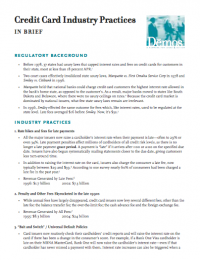A two-page brief on how deregulated credit card issuers have maximized their profits at the expense of American consumers.
Regulatory Background
Before 1978, 37 states had usury laws that capped interest rates and fees on credit cards for customers in their state, most at less than 18 percent APR.1
Two court cases effectively invalidated state usury laws, Marquette vs. First Omaha Service Corp in 1978 and Smiley vs. Citibank in 1996.
Marquette held that national banks could charge credit card customers the highest interest rate allowed in the bank's home state, as opposed to the customer's. As a result, major banks moved to states like South Dakota and Delaware, where there were no usury ceilings on rates.2 Because the credit card market is dominated by national issuers, what few state usury laws remain are irrelevant.
In 1996, Smiley effected the same outcome for fees which, like interest rates, used to be regulated at the state level. Late fees averaged $16 before Smiley. Now, it's $32.3.
